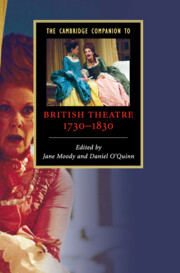Book contents
- Frontmatter
- Part I Performance
- 1 Acting and actors from Garrick to Kean
- 2 Dictating to the empire: performance and theatrical geography in eighteenth-century Britain
- 3 Scenography and technology
- 4 Spectatorship
- Part II Genres
- Part III Identities
- Part IV Places of Performance
- Part V Further Reading
- Bibliography
- Index
- Series list
2 - Dictating to the empire: performance and theatrical geography in eighteenth-century Britain
from Part I - Performance
Published online by Cambridge University Press: 28 May 2009
- Frontmatter
- Part I Performance
- 1 Acting and actors from Garrick to Kean
- 2 Dictating to the empire: performance and theatrical geography in eighteenth-century Britain
- 3 Scenography and technology
- 4 Spectatorship
- Part II Genres
- Part III Identities
- Part IV Places of Performance
- Part V Further Reading
- Bibliography
- Index
- Series list
Summary
London has dominated the historiography of the British stage in the long eighteenth century. Our theatrical histories are intensely, avowedly metropolitan; moreover, they focus almost exclusively on the playwrights, performers and managers associated with the London patent theatres, Drury Lane and Covent Garden. By comparison with discussions about literary production in provincial cities, performance outside London has received little attention. When the provinces do emerge from the theatrical shadows, it is all too often as the places from which great performers such as David Garrick and Sarah Siddons escaped for the bright lights and fame of the London stage. One of the major aims of this essay is to challenge the marginal position of provincial theatres.
The need to question what Loren Kruger has called 'the habitual assumption of metropolitan authority in London' is fundamental to the redefinition of British theatre history currently taking place. Joseph Roach's groundbreaking account of 'circum-Atlantic' performances between London and New Orleans highlighted the way in which performances cut across national borders; the last decade has also seen a resurgence of interest in Irish and Scottish theatre and a new emphasis on dramatic 'micro-history'. My own essay sets out in a different direction with the aim of producing a more comprehensive interpretation of Britain's theatrical geography. The focus of this argument is designed to reveal the circulation of performers and plots between metropolitan and provincial theatres, the varied forms of artistic innovation taking place beyond the capital and the important role of provincial stages in the business of imagining the nation.
- Type
- Chapter
- Information
- The Cambridge Companion to British Theatre, 1730–1830 , pp. 21 - 42Publisher: Cambridge University PressPrint publication year: 2007
- 3
- Cited by



